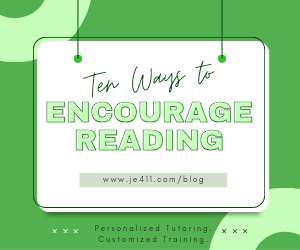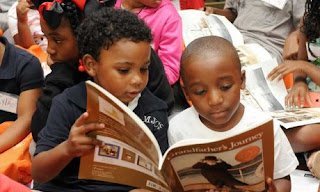Ten Ways to Encourage Reading
Encouraging reading for kids varies widely by each child’s nature and learning style. The ultimate reading goal is the transition from learning to read to reading to learn. To help kids accomplish this goal, fostering love of reading is vital. Encouraging children during the process results in adults who love to read.
I have a 10-year-old daughter and 14-year-old son. Whereas they read some of the same books to the point that I have to buy two copies (thank you, Rick Riordan!), my children require different kinds of motivation. The following list of strategies help me encourage their growth.
1. Honor Preferences
Once kids have learned to read, it is important to find out their reading style and honor their reading preferences.
My son loves math and the linear nature of solving equations. I found that he loved mysteries because they are also very linear by nature. Defined characters who solve crimes imitate step-wise, formulaic algebra. Focusing on love of a linear plot, we started with The Hardy Boys and Encyclopedia Brown. Then, he discovered Clive Cussler and James Patterson; both of whom write mid-grade novels as well as more well-known adult books. Once he polished off the mid-grade novels, he moved on to reading the adult novel versions.
2. Model Reading
If parents read, kids will follow. If there are books in a home, children look for books on their own. On the other hand, if a parent speaks badly of reading or doesn’t encourage reading outside of school, a child may never see the value in picking up a book just for fun.
I am in a mom book club that meets once a month. My middle-schooled aged son participates in Battle of the Books where his team answers questions about a pre-made list of books. Similarly, my daughter saw value in joining her own kid-version of my mom book club. The girls choose books, read them, and met up to discuss over snacks. The book club model nurtures love for reading, because sharing the experience makes reading more enjoyable.
3. Read Aloud
My 10-year-old still enjoys read alouds. Sometimes, I read books that are slightly above her reading level. Other times, I read her old favorites aloud using fun voices. This models expression. When we are in the car, audio books have the same effect. Sometimes, my daughter prefers to listen to books during homework time.
4. Find Passion
Ask kids what they like, and search for novel on the topic. If they identify with the character(s) or setting in a book, children gravitate towards reading. This can be a non-fiction pursuit like marine biology or something more fictional about pirates.
5. Think Outside the Book
Sometimes a child will find an interest that falls outside the box of traditional children’s books or young adult literature.
My son loved studying WWII and quickly exhausted most age-appropriate literature. I found the Mr. Biggles series on Amazon. Long out of print, the books gave him a first-hand but personal essay style of reading about the war and a pilot’s experience. Around the same time, he wanted to learn about physics. I found the Graphic Novel Guide to Physics which gave him a more age-appropriate overview of the material.
His sister loved the idea of mysteries as well but we had to look harder to find strong, girl role models in mystery literature. She needed to read about a protagonist that she could identify with. We found the Enola Holmes mystery series involving Sherlock Holmes’s sister, a character who solved crimes.
6. Toss Reading Levels
My kids will often pick up a book that might be below their reading level because they are old favorites. On the other side of the coin, introducing a child to a book of interest at a higher reading level can strengthen and expand their reading skills. Reading higher level books out loud to kids also can expand their reading comprehension level and vocabulary levels. As kids get older, the reading level itself becomes less important as most adult novels are written at sixth and seventh grade levels.
7. Introduce a Book Series
There's a reason we love sitcoms and movies with sequels. Introducing a book series can motivate kids to read more as their attachment to story lines grows. From Harry Potter to the Lightning Thief series, there are many options. Kids that are hooked on a book series continue reading.
8. Provide a Multi-sensory Experience
After my kids read books, I frequently find the video or movie version of the book or other complimentary option. My daughter loved reading about Helen Keller and found even more depth in the books when she watched The Miracle Worker. The Junie B. Jones books and Lily and Plastic Purse books came alive when she visited the children’s theater to watch live theater versions of the books. The Narnia series of movies gave both of them a fantastical view of the books to add to what they'd already imagined.
9. Supplement with Project Based Learning
Check out Teachers Pay Teachers for teacher lesson plans to add further dimension to the basic act of reading. Incorporating project-based learning projects with text-reading has a longer-lasting impact on learners.
A science-themed book might instigate a trip to a local science museum while a crime-solving heroine like Nancy Drew may be complimented with an inexpensive spy kit. Also, kids studying Houdini might appreciate learning simple magic trips to identify with Harry’s pursuit of magic. There are a variety of project-based learning kits on the market today.
10. Encourage Questioning
I read books as a child that were probably horribly inappropriate like Clan of the Bear and Flowers in the Attic and Are You There God, Its Me Margaret. With many online sources offering parent and publication reviews, parents can examine content without reading and prepare responses to questions about sensitive subjects introduced in texts. Kids should feel comfortable to openly talk to us about content.
By taking a look at a child’s interests with an eye on expanding the reading experience, parents and teachers can encourage a lifelong love of reading.
A very special thanks goes to educator and guest blogger, Amy Barnes.



